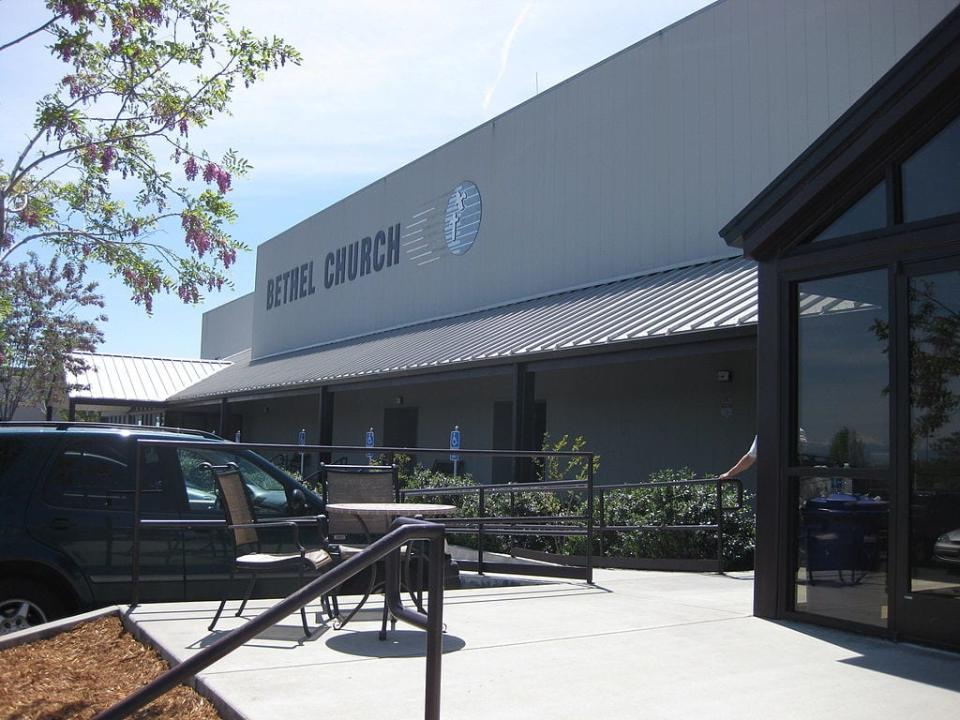The Mystical Megachurch Ruling Over Soccer Star Megan Rapinoe’s Hometown

In the hours after Megan Rapinoe and the U.S. women’s national soccer team’s World Cup victory, the footballer celebrated on Instagram with a photo of her hometown paper, the Record Searchlight. The caption read: “Hometown love is the best kind of love.” Rapinoe grew up in the small logging town of Redding, California, and has maintained a close relationship with the community. She runs spring soccer clinics, regularly comes home for the annual Redding Rodeo, and even spearheaded a fundraiser after the Carr Fire destroyed several local homes. In the past, the town has celebrated their homegrown celebrity: in 2015, Redding declared July 21 “Megan Rapinoe Day,” named a street in her honor, and changed the address of their soccer field to “15 Rapinoe Way,” after her jersey number. But Redding’s relationship with Rapinoe has grown uneasy. In a recent Record Searchlight letter to the editor, a resident called the soccer player “a selfish unpatriotic bigot and a total disgrace to our national team.” In a follow-up article, an ex-firefighter told the Searchlight he “hope[s] she breaks her legs.”
As a general rule, Redding skews conservative. Shasta County, represented by Republican Doug LaMalfa in the House, is one of the most solidly red counties in California—roughly 64 percent of local voters are registered Republicans and in 2016, the county turned out overwhelmingly for Trump, including Rapinoe’s father. In June, when Rapinoe kneeled during the National Anthem in solidarity with Colin Kaepernick, she irked many of her old neighbors. That sentiment compounded when Rapinoe announced she would not go to the White House if she won the World Cup, and joined the roster of public figures singled out on the president’s Twitter. “The team being invited to the White House, Americas house, is an honor,” said Karen Margrave, a Redding realtor who first expressed her anger on Facebook. “It doesn’t matter whether or not you like the President, you’re representing Americas Soccer Team! Everything doesn’t have to be political.”
How ‘Walking Protest’ Megan Rapinoe Became U.S. Soccer’s Middle Finger to Trump
Rapinoe’s international celebrity has put Redding and its political fault lines in the spotlight. But the politics of Redding are complicated beyond simple party affiliations, in part because the town is also home to another divisive, wildly successful, cultural claim to fame: the Bethel Church. The multimillion-dollar revivalist megachurch has stirred controversy in Rapinoe’s hometown and throughout the religious world for its embrace of consumerist Christianity, extensive gay conversion therapy programs (Rapinoe is an out lesbian), and semi-mystical practices. Bethel members believe that miracles can occur on earth, and YouTube is filled with footage of their efforts: from faith healing, to “fire tunneling” (where members form a “tunnel” with two lines and pray over people passing through), to “grave sucking”—where someone lies on a grave to “suck up” the dead person’s blessings (a Bethel spokesperson, who wrote to The Daily Beast after this article first published, said that the Church discourages this practice).
Bethel wields immense local influence: of Redding’s 90,000 residents, 11,233 are Bethel members, according to a report from northern California magazine A News Cafe. They maintain an extensive media presence—including a TV subscription service with 19,000 subscribers, two weekly podcasts with downloads in the millions, several well-attended annual conferences, and a music production arm with multiple chart-topping hits. (Justin Bieber is a fan; last year, he covered one of their singles, “Reckless Love”). Media and product sales alone earned Bethel some $23 million last year, according to A News Cafe, but the registered “nonprofit” organization also generates income from a K-8 academy called Bethel Christian School, an online and summer program called WorshipU, the Bethel School of Technology, the Bethel Conservatory of the Arts, and recently announced plans for the Bethel Business School. Most famously: they operate the Bethel School of Supernatural Ministry, where each year some 2,000 students pay $12,050 ($5,250 per year) to study at the unaccredited three-year seminary, also known as “Christian Hogwarts.”
Bethel plays a unique role in the political landscape of Redding. The town’s mayor, Julie Winter, serves on Bethel’s Board of Elders and the church—which reported a budget of $60.8 million last fiscal year, in an area with a $46,389 median income—has funded several city initiatives. In 2011, when Redding considered closing its civic auditorium for financial reasons, Bethel offered to lease and manage it for the town, putting in some $1 million for repairs and paying an annual rent of $750,000, according to a press release from last year. In 2017, when the police force faced budget cuts, Bethel donated $500,000 to the unit, and then spearheaded a campaign to raise an additional $740,000 to pay the salaries of four officers. Just months later, the council unanimously voted to approve construction for a new, $96-million church campus, despite widespread local concern. As an enthusiastic article in Zôcalo Public Square put it: “Bethel’s engagement with Redding is big and broad, touching almost every aspect of civic life.”
The church’s strengthening grip on the town has bred suspicion and resentment among non-Bethel residents which far exceeds any angst over Megan Rapinoe. Spokespeople for the Bethel Church, the Bethel School of Supernatural Ministry, Bethel Senior Leader Bill Johnson and Bethel Senior Associate Leader Kris Valloton declined to speak with The Daily Beast for this story. In a statement provided by email, a Bethel representative wrote: “We celebrate the US Women’s Soccer Team’s historic fourth win of the World Cup and join in applauding our hometown’s talented athlete, Megan Rapinoe, and the success she has achieved on the world stage!”
The roots of Bethel date back to 1954, when the church opened in Redding as an affiliate of a Pentecostal denomination called the Assemblies of God. For years, Bethel existed as a modest offshoot. That changed in 1996, when a pastor named Bill Johnson signed on to lead the ministry. According to Johnson’s personal biography, he accepted the job on a single condition: “I was born for revival and would pursue revival—this was not negotiable.” Once he took over, the church began to grow and, as Johnson put it, “to see many healings including multiple cases of cancer healed.” In 1998, Johnson and an auto repairman-turned-prophet named Kris Vallotton opened the Bethel School of Supernatural Ministry. The goal, according to an alumni report, was to “equip and deploy revivalists who passionately pursue worldwide transformation in their God-given spheres of influence.” The first class had 36 students; by 2010, there were 1,500. Now, the school boasts more than 10,000 alumni.

Much of the local resentment toward Bethel involves their practice of “faith healing,” or the belief that physical ailments can be cured by prayer. According to Redding residents, it’s common for Bethel members to approach pedestrians and offer to help with minor ailments. “They stop you and ask to pray for something that they think is wrong with you,” said Nathan Blaze, a 15-year Redding resident and the administrator of two Redding-themed meme pages: “Redding Be Like” and “Bethel Memes.” But Bethel members direct faith healing at more serious and permanent conditions. Will Smith, a former Bethel member who lives in the Bay Area, said congregants often approach his friend’s son, who lives with cerebral palsy, offering to cure his illness—a gesture the child and his parents find distressing.
Faith healers believe all health concerns are curable with enough effort, from cancer to HIV to actually being dead—a Bethel alum maintains something called a “Dead Raising Team.” In a survey of Bethel School of Supernatural Ministry alumni from 2018, graduates claimed to have healed 50,000 people since last year, “including several dead raisings!” It’s a practice that secular citizens have found traumatic: In 2008, a Shasta County man sued a Bethel student over an accident which left him paraplegic. The man claimed she had pushed him off a cliff and, upon thinking he had died, attempted to faith heal him rather than call 9-1-1 (a judge later ruled in favor or the student).
Still, the practice continued. On January 2, 2014, a 15-year-old boy named Orian LeBlanc suffered from an asthma attack and collapsed in the street. A Bethel student named Andrea Martin found his body. According to the boy’s grandmother, Donna Zibull, doctors said LeBlanc was still alive when she found him—he had passed out from lack of oxygen and cardiac arrest. But in a post on Facebook, Martin claimed the boy had already died and that after she’d prayed, paramedics had revived him. LeBlanc spent six days in the hospital in a vegetative state before passing away on January 8, 2014. According to Zibull, a Dead Raising Team visited him there and spent four days chanting, speaking in tongues, claiming they saw God in the room, and promising his mother Orian would come back. “I know it’s a hard call for anyone to come upon that situation, but afterwards, the Bethel lady brought several people up to [Orian’s] room,” Zibull said. “They were up there for like four days, trying to revive him... It got too out of control. We had to just ban them from the room.”
A Bethel spokesperson, who wrote to The Daily Beast after this article first published, denied that Martin had lead a Dead Raising Team, and maintained that she had done nothing wrong."There was no 'Dead Raising Team' present, it was Andrea and her friends who cared for this boy and the family and were praying for him while he was in a coma. I can’t imagine the pain this grandmother went through; she seems to be misrepresenting some of the circumstances [in] this case."
After her grandson’s death, Zibull got involved with a small group of Redding residents and started a Facebook page called “Concerned Citizens About Bethel.” They started with about 40 people, but the group quickly grew to over one thousand members. In 2017, Zibull took over the group and renamed it “Investigating Bethel.” Zibull held meetings, passed out stickers, and scheduled protests around Bethel’s faith healing conferences. The group began keeping count of local businesses owned by Bethel members. And they started getting concerned about an idea at the crux of the church’s ideology: the “Seven Mountain Mandate.”

The “Seven Mountain Mandate” is the belief, held across several Pentecostal and Charismatic movements, that in order for Jesus to return to earth, churches must influence and infiltrate the seven major pillars of society: government, media, arts and entertainment, education, family, religion, and business. In the book The Rise of Network Christianity, which includes deep investigations into Bethel’s practices and ideology, Brad Christerson and Richard Flory claim that the goal of the mandate is to radically transform cities, ethnic groups, and nations as opposed to just individuals. “If Christians permeate each mountain and rise to the top of all seven mountains,” they write, “society would have biblical morality, people would live in harmony, there would be peace and not war, there would be no poverty.”
It’s a stance that helps explain Bethel’s investment in producing their own media, opening schools, sponsoring local arts, and expanding local businesses. It also is why Zibull, Blaze, Smith and others grew concerned over the church’s role in local and national politics. Colton Redwine, a former Bethel student who was dismissed from the school after coming out as gay, pointed to the church’s political track record on legislation related to homosexuality, which it opposes and believes can be altered with conversion therapy. In 2018, Bethel came down hard against three bills in the California state legislature: AB 1779, AB 2119 and AB 2943, which aimed to restrict gay conversion in California, including prohibiting licensed mental health officials from offering conversion therapies. The church released statements and sent letters to legislators opposing the bills. In a live-streamed lecture called “What Would Jesus Do In A PC World?,” Bethel’s second-in-command, Kris Vallotton, urged the congregation to reach out to officials and get the bills withdrawn. When Redding residents led a protest rally, Vallotton walked back his comments, but maintained opposition to the bills.
"In 2018, we took a position in favor of this belief by advocating for legislation that would ensure access to counseling and other resources for those who do not wish to embrace same-sex attraction," a Bethel spokesperson wrote in a statement provided to The Daily Beast after this article first published. "The purpose of our advocacy was to protect all people’s freedom to access resources that they feel will best aid them in their personal journey. We stand against any and all forms of therapy that involve manipulation, force, humiliation, or physical harm to bring about change in one’s sexuality."
Smith, a former Bethel member, said he left the church after its Senior Leader, Bill Johnson, and his wife, Beni Johnson, made public statements of support for Trump following the 2016 election, citing their opposition to abortion, “open border policies,” welfare, same-sex marriage, socialism, and higher taxes, among other things. “I had always picked up on little subtle conservative points in their sermons, but it didn’t bother me,” Smith said. “It was really around 2016, when Trump started becoming a big figure in the election, that my thoughts on Bethel started to change. People call Megan Rapinoe political, but it became clear to me that they were very politically motivated.”
This article has been updated to reflect comments from Bethel.
Got a tip? Send it to The Daily Beast here
Get our top stories in your inbox every day. Sign up now!
Daily Beast Membership: Beast Inside goes deeper on the stories that matter to you. Learn more.

